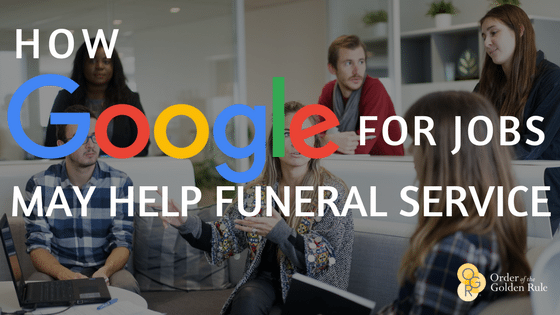How ‘Google for Jobs’ May Help Funeral Service
Originally Published on OGR’s Blog
Where do you, as a funeral home owner, go to find good help? With baby boomers approaching retirement age, you’ll soon have job openings available, but you may find it hard to convince potential job candidates to work for you. Funeral service isn’t exactly sexy and without the right knowledge of all the rewards your funeral home can offer them, exposure to hazardous chemicals and long hours, for example, may cause potential employees to overlook the opportunity to make a difference in families’ lives by creating memorable funeral service experiences for those in grief.
Funeral homes have typically found employees in a variety of places: the “Help Wanted” section of the newspaper or on websites like Craigslist or Linkedin. They might have also used Facebook to advertise and send prospective employees to the funeral home website or put up job ads on the church bulletin board or in local stores. They might even leverage their relationship with a nearby mortuary school and provide internships to students or hire friend’s children to work part-time. Funeral homes have long found employees in a variety of places.
The Challenge: Helping the Right Talent Find the Right Jobs
The new challenge is that a job in funeral service is no longer tied neatly to a job description. This is a reflection of the current state of jobs in many industries. Forbes reports that today’s job descriptions are moving away from being fixed to more hybrid in nature. “These new ‘hybrid jobs’ (e.g. digital marketing experience manager) do not lend themselves to static job descriptions and simple job titles. They are jobs that require technical, industry, managerial, and integrated thinking skills; they often require skills in communication, persuasion, and teamwork.”
Sound familiar? How do you identify the exact candidate you want based on a simple job  description? Doesn’t a funeral director wear a variety of hats and function in a variety of roles? Do your current job descriptions reflect this? OGR has seen funeral home owners try to solve this problem by moving away from using the title “Funeral Director” for its employees and toward titles like “Funeral Event Planner”, “Memory Maker”, or “End-of-Life Transition Specialist”. They hope their new job titles will communicate the role their employees have and the value of what their funeral home offers to the public.
description? Doesn’t a funeral director wear a variety of hats and function in a variety of roles? Do your current job descriptions reflect this? OGR has seen funeral home owners try to solve this problem by moving away from using the title “Funeral Director” for its employees and toward titles like “Funeral Event Planner”, “Memory Maker”, or “End-of-Life Transition Specialist”. They hope their new job titles will communicate the role their employees have and the value of what their funeral home offers to the public.
Traditional funeral services positions have focused on candidates who have been through mortuary school and have a funeral director/embalming license, but with fewer funeral directors staying in the profession, it may be time for funeral service managers to think about blurring the lines of traditional positions. Why not consider creating more hybrid job descriptions? Would you consider including information regarding the company culture and benefits in the job description to recruit top talent?
The Solution: Google for Jobs
Until last week, search engines would bring up jobs based on a job title and just a few keywords in the job description, further aggravating the problem. This is no longer the case. Google has announced they’ll be using their algorithm to help qualified job candidates find jobs that match their skills on a new section of its search engine: Google for Jobs. A job search on Google “collects and organizes millions of job postings from all over the web to make it easier for job seekers to find jobs” in one place. Searchers can use filters to find jobs, for example, within a 30-minute commute of their home, that are part-time, and that fit into a certain category. Google isn’t circumventing current search engine sites either, but rather partnering with them. LinkedIn, Monster, WayUp, DirectEmployers, CareerBuilder, Glassdoor, and Facebook are just a few companies they’ll be partnering with in this endeavor.
A beautiful factor in all of this is that Google for Jobs will take its search engine’s ability to understand how jobs are related and cluster them together. For example, if a potential employee is interested in a career as an event planner and doesn’t know that funeral service could be a good fit, a search for “event planning” could mean that “event manager”, “conference services manager”, or “celebration of life planner” might appear on Google for Jobs. Searchers who look for “event planning” would see all matching job types and might discover funeral service as a potential industry.
How Does It Work?
Google for Jobs can now be used by simply going to Google and typing a job title into the search bar. Typing “funeral service” into Google brings up the following job openings in Austin, TX.

You’ll notice that jobs posted on the left-hand side originate from Glassdoor, TSAE Career Headquarters, LinkedIn, and Jobing.com. The searcher can filter the search down even further using “category”, “title”, “date posted”, “type”, etc.
So what’s a funeral home owner to do? Time will tell how Google for Jobs impacts job searches in the long run, but if you want to have your job postings indexed by Google right away, you have two options: you can either publish them on any of the sites listed here or follow Google’s direct integration guide. It’s a bit complicated, so ask your website management company or a staff member who manages the website to help you if you decide to do the direct integration. Additionally, consider rewriting your job descriptions to match the changing needs of your business. You’ll be harnessing the power of Google’s newest tool and be well on your way to finding the top talent for your funeral home.




